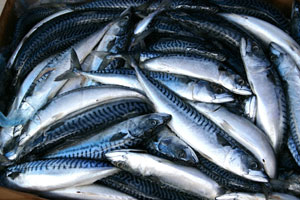|
||||
|
Alternative to a Rock and a Hard Place On Tuesday October 17, 2006 headlines announced worldwide that “More benefits than risks in higher fish consumption.”1 Clearly, this headline says you should eat lots of fish to be healthy. The controversy surrounding benefits and risks comes from the facts that fish provide “good fats,” also known as omega-3 fats—but fish are also contaminated with environmental chemicals like methylmercury, dioxins, and PCBs. As a result people don’t know the right choice to make. Some health and nutrition advisors worry that “confusing messages and inflated fears are keeping the public from getting the benefits that come from eating fish.” I worry that people are being oversold the benefits and undersold the risks. The news reports do recognize some risk, “A few fish species — shark, swordfish, king mackerel and tilefish — have been found high in methylmercury, linked to learning disabilities and developmental delays in children. Women who are pregnant or likely to become pregnant and children under 12 have been advised to avoid these fish.”
There Is More Wrong with Fish than Environmental Contaminants Regrettably, this article disregarded many other adverse consequences stemming from consuming fish. This food causes a rise in blood cholesterol levels similar to the rise caused by beef and pork.2 The highly-acidic animal proteins accelerate calcium loss,3 contributing to osteoporosis and kidney stones. No dietary fiber or digestible carbohydrates are present in fish—thus, having a negative impact on bowel function and endurance. Although omega-3 fats “thin” the blood, preventing thrombus formation (heart attacks); this same anticoagulant activity can increase the risk of bleeding. These fats also have antiinflammatory properties, which can be beneficial (reducing arthritis pain) and deleterious (causing immune suppression, increasing the risk of cancer and infection).4 Fatty fish, recommended salmon for example, is half fat and loaded with calories, adding to ones risk for developing obesity and type-2 diabetes. Furthermore, omega-3 fats inhibit the action of insulin, thereby increasing blood sugar levels.5 Who Eats 6 ounces of Salmon a Week? The authors believe the maximum benefits from fish are achieved by consuming 250 mg per day of omega-3 fats, which they translate into 6 ounces of wild salmon a week—more than this amount causes no additional health benefits. Unfortunately, when the public hears “fish is good,” many people exceed the 6-ounces per week recommended, replacing meat and poultry with seafood at many meals—so in real life, the hazards of fish-eating are magnified by health-conscious consumers trying to do their very best to avoid heart disease. The Smart Choice for “Good” Fats Animal systems lack the ability to synthesize omega-3 fats, thus fish cannot make essential fats. Seaweeds and algae synthesize these fats that are then stored in the flesh; along with contaminants, cholesterol, animal protein, and calories. To avoid all of the hazards, the practical alternative is to simply consume the original sources of these “good fats”—plants. The human body has no difficulty converting plant-derived omega-3 fat, alpha linolenic acid, into DHA or other n-3 fatty acids, supplying our needs even during gestation and infancy.6 End of the Good Fish-Bad Fish Controversy When I was young people were told to eat “white fish,” because these varieties were low in fat—fatty fish like salmon and tuna, could make you overweight. Then the discovery was made that Greenland Eskimos had very low rates of heart disease.7 Fish fat was thought to be the reason because it thinned the blood, preventing the blood clots that cause heart attacks from forming.. Thus the only selling point for fish is their high concentration of stored omega-3 fats (eicosapentaenoic acid—EPA and docosahexaenoic acid--DHA). The easy answer for good health became fish oil capsules added to a daily diet of meat and dairy or replacing a few beef dinners with a fish-fillet sandwich. For most people these changes are much easier than adopting a vegetarian diet. The obvious truth is adding a little good fat cannot possibly negate the multitude of harms from the rich Western diet. The well-informed consumers will put the “good fat-bad mercury controversy” behind them and conclude fish-eating has an overall negative impact on human health when it replaces low-contamination, low-fat, no-cholesterol, starches, vegetables and fruits. References: 1) Weise E. More Benefits Than Risks in Higher Fish Consumption. USA TODAY http://www.firstcoastnews.com/news/health/news-article.aspx?ref=rss&storyid=67375 .2) Davidson MH, Hunninghake D, Maki KC, Kwiterovich PO Jr, Kafonek S. Comparison of the effects of lean red meat vs lean white meat on serum lipid levels among free-living persons with hypercholesterolemia: a long-term, randomized clinical trial. Arch Intern Med. 1999 Jun 28;159(12):1331-8. 3) Robertson WG, Heyburn PJ, Peacock M, Hanes FA, Swaminathan R. The effect of high animal protein intake on the risk of calcium stone-formation in the urinary tract. Clin Sci (Lond). 1979 Sep;57(3):285-8. 4) Meydani SN, Lichtenstein AH, Cornwall S, Meydani M, Goldin BR, Rasmussen H, Dinarello CA, Schaefer EJ. Immunologic effects of national cholesterol education panel step-2 diets with and without fish-derived N-3 fatty acid enrichment. J Clin Invest. 1993 Jul;92(1):105-13. 5) Hendra TJ, Britton ME, Roper DR, et al. Effects of fish oil supplements in NIDDM subjects. Controlled study. Diabetes Care. 1990 Aug;13(8):821-9. 6) Langdon JH. Has an aquatic diet been necessary for hominin brain evolution and functional development? Br J Nutr. 2006 Jul;96(1):7-17. 7) Dyerberg J, Bang HO. Haemostatic function and platelet polyunsaturated fatty acids in Eskimos. Lancet. 1979 Sep 1;2(8140):433-5. <<< Return to Newsletter Home Page
|


 However,
the overall conclusion from news reports is that you can put this
controversy behind you because of an evaluation of the risks and
benefits of fish intake by Mozaffarian and Rimm which appeared in the
October 18, 2006 issue of Journal of the American Medical Association.
Their analysis of published studies to date caused these authors to
conclude, “For major health outcomes among adults, based on both the
strength of the evidence and the potential magnitudes of effect, the
benefits of fish intake exceed the potential risks. For women of
childbearing age, benefits of modest fish intake, excepting a few
selected species, also outweigh risks.”
However,
the overall conclusion from news reports is that you can put this
controversy behind you because of an evaluation of the risks and
benefits of fish intake by Mozaffarian and Rimm which appeared in the
October 18, 2006 issue of Journal of the American Medical Association.
Their analysis of published studies to date caused these authors to
conclude, “For major health outcomes among adults, based on both the
strength of the evidence and the potential magnitudes of effect, the
benefits of fish intake exceed the potential risks. For women of
childbearing age, benefits of modest fish intake, excepting a few
selected species, also outweigh risks.”